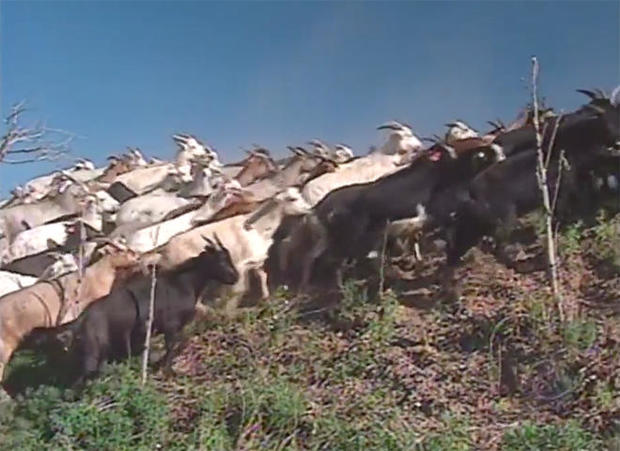
Sunday Morning CBS News August 10, 1999, 4:02 PM
Denver, Colo., is hailed as a progressive, global, high-tech city of the future. But few people probably know that Denver is also a place where a shepherd can still find a job.
As CBS News Sunday Morning Correspondent Bill Geist reports, one of Denver’s most innovative new practices dates back to biblical times:
In recent years, Denver has been faced with a troubling force of nature. Thousands of acres of noxious weeds have spread through the city, creating seemingly endless meadows of wild flora. In an effort to deal with the botanical nightmare, the city turned to an unlikely ally: goats.
“The more I thought about it, the more excited I got,” says city naturalist Gail Weinstein. “I got to the point I couldn’t sleep at night. I was so nervous about it. I thought this is great.”
She told Mayor Wellington Webb about her idea to put goats on the city payroll, something he initially thought was preposterous.
Cashmere goats, native to Mongolia, can now be seen browsing the Denver landscape. “I look at them as providing a city service, and they don’t ask for much,” Mayor Webb says jokingly.
To deal with thousands of acres of noxious weeds spreading through the city, Denver turned to an unlikely ally: goats. CBS News
These eager new civil servants rise early at their Denver campsite, the abandoned Stapleton Airport. Under the watchful eyes of shepherd Lani Lamming and Jack the “Wonderdog,” the herd swarms down to the river for a slurp of river water and nutritious, all-natural breakfast: field greens presented on a bed of dirt.
Where perhaps every other mammal on earth sees prickly, deadly weeds, goats see an all-you-can-eat buffet. “I believe it’s in the Bible that the goat has an iron gut,” says Lamming.
Lamming owns the flock and is making a healthy business with these furry little four-legged weed eaters, with her $50,000 contract with Denver.
“I got [the idea] when I was in grad school,” Lamming explains. “I have a master’s degree in weed science.… The idea to me was if you would offer grazing as a service that you could use as an alternative to herbicides, that people would really like it.”
“But you would have to offer everything: all the animals, all the fence[s], the water, transport ’em, take care of ’em, move ’em. And then it would work,” Lamming says. “I have 1,600 head out right now in four major areas: three in Colorado and one in Wyoming. We did work in Utah last year.”
While she works for Denver, her husband Fred and their four boys are mowing lawns in Jackson Hole, Wyo., where lawns get fairly large.
But the family business wasn’t so easy to start. Lamming needed a loan and asking for “goat money” was a challenge.
“It was pretty funny,” Lamming remembers. “And they had to ask twice, ‘For what? You want how much? How much, $10,000?’ I had to put up my truck.”
Her business took off. It turns out that weeds are a very big deal out west, where an estimated 5,000 acres a day are lost to noxious plants.
“They’ll come in and take over an ecosystem, which will push out all the native plants, which in turn push[es] out all the native wildlife, mammals, reptiles, birds,” Lamming says.
“They seem happy to hop in the truck. Well, every day they want to get up and eat. There aren’t too many jobs for humans like that where you just eat all day,” she quips.
In Denver the goats pack into the trailer for their daily commute to work, looking like so many subway riders. Then they rush to the weeds like diners to an early bird special.
Their happy mission this day is to strip two acres of noxious weeds from the banks of the Platte River.
“People stop and they want to know what we’re doing,” says Lamming. “They love the goats; they love to watch ’em. They love to see ’em in the landscape. And they’ll stop and they may stand here for two hours and visit.”
And so the total lawn care machine for the new millennium is here: The cashmere Turbo-Goat 2000 seeks out and destroys noxious weeds, tills the soil, tamps down new seeds, and even fertilizes them!
“They can get places we can’t, like the bank over there, and these tractors won’t go there without winding up in the water,” says one gardener. “I think it’s a good idea. I think there are lots of places they’ll be very useful.”
Most importantly, they love their work so much that they don’t want to go home at night. Surely an old idea’s time has come.
© 1999 CBS Interactive Inc. All Rights Reserved.
